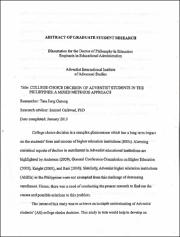| dc.description.abstract | College choice decision is a complex phenomenon which has a long term impact
on the students' lives and success of higher education institutions (HEis). Alarming
statistical reports of decline in enrollment in Adventist educational institutions are
highlighted by Anderson (2009), General Conference Commission on Higher Education
(2005), Knight (2005), and Rasi (2010). Similarly, Adventist higher education institutions
(AHEis) in the Philippines were not exempted from this challenge of decreasing
enrollment. Hence, there was a need of conducting the present research to find out the
causes and possible solutions to this problem.
The intent of this study was to achieve an in-depth understanding of Adventist
stUdents' (AS) college choice decision. This study in tum would help to develop an
effective strategy to solve an ongoing problem of declining enrollment. As a result of it, it
would have a positive impact on AS' lives and the success of AHEis. Moreover, the
·Adventist Church will find committed, mission-oriented, and ethical Adventist leaders in
order to continue the Adventist mission and evangelism in the world.
The convergent parallel mixed-method research design was employed in this
study. The qualitative and quantitative data were collected and analyzed simultaneously.
A purposive random sampling strategy was utilized for collecting 300 surveys. The
A multistage purposive sampling technique was used for the qualitative data collection.
There were 16 participants (eight participants from AHEI and another eight from non-Adventist
higher education institutions for individual interviews. Two focus group
interviews were conducted with the same 16 participants. The qualitative and quantitative
findings were summarized and compared to see whether convergence or divergence
occurred.
·The factor cost appeared as the most influential factor for AS in choosing HEis.
The influential people of AS' choice of HEis were family members, friends, pastors, and
alumni. The fixed college characteristics that influenced AS in selecting HEis were :
institutional quality, cost, spiritual environment, awareness, career opportunity, location,
facilities, campus safety, and philosophy, and practice. The effort of AHEis to
communicate through effective promotion, brochures, media, and social networking
promotion surfaced as an effective means of attracting AS. Campus safety was the only factor
that came out of the qualitative data analysis. The Adventist philosophy and practice, and
campus safety emerged as unique factors as the contribution of this study in addition to
the above-mentioned factors that influenced AS' choice of HEls. | en_US |

